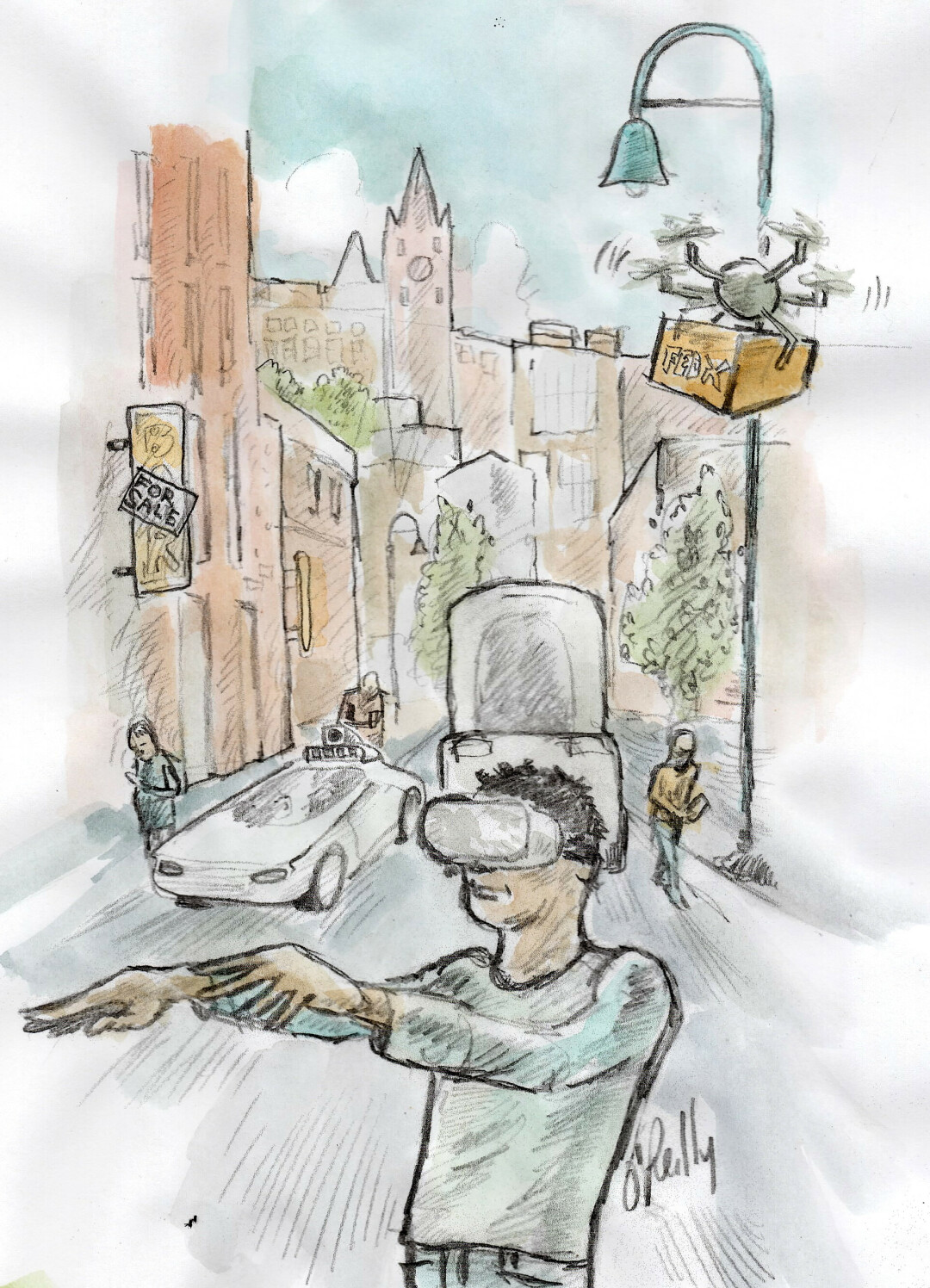Analog man living in a digital world
Cartoonist by Kyle O'Reilly
Cartoonist by Kyle O'Reilly

Look out! The titans of the tech Industry are stepping in to save us from a world of strife, inequity and the certain doom of ecological catastrophe. These benevolent dictators of progress have a vision that will raise us out of the low-fidelity depths of the analog past and herald a new age of high definition enlightenment.
Unfortunately, the past they want to save us from was created by similar forces in a bygone tech industry. Fixing the failures of the Industrial Revolution by using the products of a new Industrial Revolution seems like we’re digging ourselves deeper into a hole. Before we buy into this dubious sales pitch, it’s probably worth looking into the root of the problems we’re trying to solve.
The Industrial Revolution of the late 18th century succeeded in providing larger quantities of goods at lower prices, major advances in communication and medicine and innovations that contribute to global cooperation and peace, but not without a cost. These benefits came at the expense of worker safety, the health of the environment and the health of society at large. The rise of the factory system led to urban decay and pollution. Wages and the true value of goods saw colossal shifts. For the common man and the planet as a whole, the promise of the Industrial Revolution fell short of its potential. Somewhere along the way, virtue and idealism took a back seat to greed and lust for power.
For every solution the technological revolution creates, a new problem pops up somewhere else. One example is the way tech steals jobs. Just like the machines at the turn of the century that eliminated skilled labor and turned workers into button-pushers, the new wave of cost-saving Artificial Intelligence doesn’t ease the workload of employees, it eliminates the need for employees. What is our workforce going to look like in a capitalistic system when there are no truck drivers, accountants, pharmacists or bank tellers? We can’t all be roofers and massage therapists.
Maybe it’s time for us to forego convenience and cheap goods so that we can all earn a decent living doing satisfying work and interacting with real people. Or perhaps it’s time to actually reap the benefits of technology by increasing wages to match increases in productivity while shortening the workweek.
Another problem riding the shirttails of technology is the widening of divisions in our society. Tribalism has been exacerbated by social media and the proliferation of internet news that leads to political partisanship, absurdist conspiracy theories, and a loss of trust in media.
There is also a gap in the access to technology which leads to disparities in economic levels and education. This is especially evident in the midst of the Covid-19 pandemic. Kids blessed with good connection speeds at home have a huge advantage over kids with limited internet access. Currently, the libraries are closed and free access has been cut off to a lot of people who rely on it. Students aren’t the only ones who are affected. Try looking for a job or an apartment in this paperless era. Who is more likely to miss a bill payment and suffer from a bad credit score? A person with automatic online bill payments, or someone who has to remember to get the check in the mail on time and entrust it to our beleaguered postal service?
The internet should be used to provide free information sharing, as it was originally intended. Instead, it has become a drug that keeps us hooked to our phones in the service of companies in the business of data mining and product placement. We should eliminate this profit-driven model and rid ourselves of the destructive tendencies it brings out in us.
The effects the technological age has on the environment is much more complicated, but we know the demand for electricity is the driving force behind climate change. Technology has created new ways to make clean energy, but implementing them is costly and it’s difficult to keep pace with global demands. In the case of the environment, it might be better to look for non-tech solutions to problems. For example, in addition making cars that pollute less, why don’t we build pedestrian-friendly communities that encourage exercise and decrease pollution and congestion?
We can’t hold our breath waiting for the tech giants to sort all of this out for us. They are not above the emotional trappings that got us into this mess and their massive, cybernetic brains are not hardwired to see into the foggy lens of the future. It’s time to stop worshiping these self-important megalomaniacs and solve our own problems. The solutions we need are going to be gradual and difficult, like lowering cholesterol or training for a marathon. That shining knight galloping to the rescue on a solar-powered steed is nothing more than a dot-com startup running on bitcoin, making empty promises and falling into the same old tropes it promised to revolutionize.
Technology itself isn’t bad, it’s the culture of greed and corruption that latches on and tries to monetize the industry instead of creating a better future for everyone. To combat that kind of thinking, we need to work together as organic, free-range human beings towards a kinder, more humane world by putting down our smartphones, taking stock of the world around us and enjoying each other’s company before it’s too late.
| Tweet |